- Home
- »
- Advanced Interior Materials
- »
-
Artificial Turf Market Size And Share, Industry Report, 2033GVR Report cover
![Artificial Turf Market Size, Share & Trends Report]()
Artificial Turf Market (2026 - 2033) Size, Share & Trends Analysis Report By Material (Polyethylene, Polypropylene, Nylon), By Application (Residential, Commercial, Sports), By Region(North America, Europe, Asia Pacific, Latin America, MEA), And Segment Forecasts
- Report ID: GVR-3-68038-667-7
- Number of Report Pages: 101
- Format: PDF
- Historical Range: 2021 - 2024
- Forecast Period: 2026 - 2033
- Industry: Advanced Materials
- Report Summary
- Table of Contents
- Interactive Charts
- Methodology
- Download FREE Sample
-
Download Sample Report
Artificial Turf Market Summary
The global artificial turf market size was valued at USD 7.27 billion in 2025 and is projected to reach USD 13.67 billion by 2033, growing at a CAGR of 8.3% from 2026 to 2033. The demand for artificial turf is increasing due to rising concerns about water conservation and the high maintenance cost of natural grass, especially in drought-prone and high-temperature regions.
Key Market Trends & Insights
- Asia Pacific dominated the artificial turf market with the largest revenue share of 32.2% in 2025.
- India is expected to grow at the fastest CAGR of 8.0% over the forecast period within the Asia Pacific region.
- By material, the polyethylene segment is expected to grow at the fastest CAGR of 8.7% over the forecast period.
- By application, the commercial segment is expected to grow at the fastest CAGR of 8.6% over the forecast period.
Market Size & Forecast
- 2025 Market Size: USD 7.27 Billion
- 2033 Projected Market Size: USD 13.67 Billion
- CAGR (2026-2033): 8.3%
- Asia Pacific: Largest market in 2025
Urbanization and infrastructure development have boosted landscape design in residential, commercial, and public spaces, where synthetic turf offers year-round aesthetic appeal with minimal upkeep. Growth in sports infrastructure, including football, hockey, golf, and multi-purpose arenas, is a significant driver as turf offers durability, consistent performance, and lower long-term costs compared to natural surfaces. Increasing adoption in educational institutions, parks, and recreational zones further supports this trend.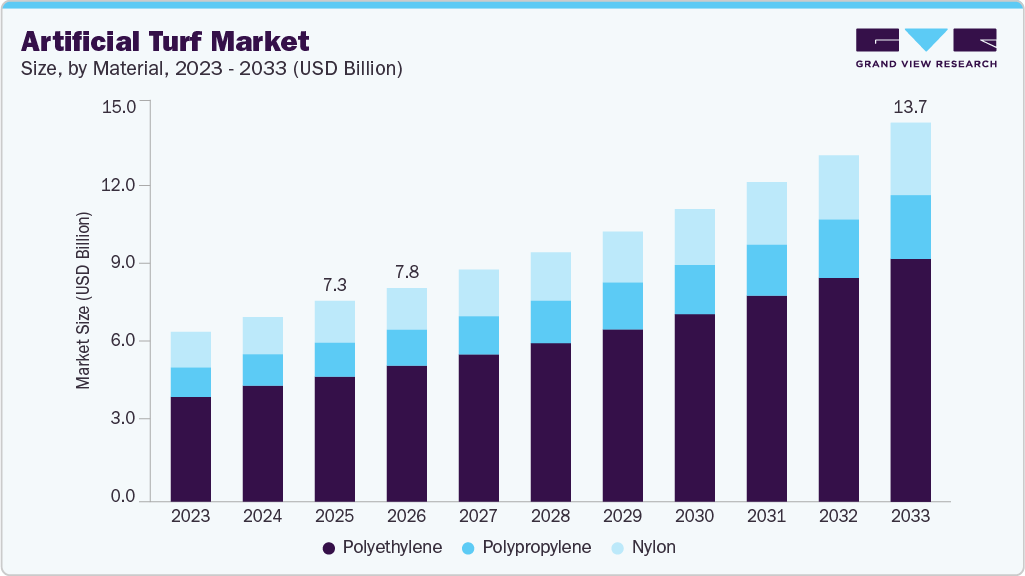
Key drivers in the artificial turf market include stringent water-conservation regulations, which make synthetic turf a preferred choice for landscaping, public parks, and urban infrastructure projects. The growing sports industry, particularly professional leagues and school sports programs, continues to drive demand across the artificial grass turf market for durable, all-weather playing surfaces that deliver consistent performance and longer lifecycles than natural grass. Additionally, technological advancements in materials used in the artificial grass market, such as UV-resistant fibers, heat-reducing infill, and recyclable backing, have enhanced product value and expanded applications across commercial rooftops, playgrounds, and therapeutic spaces.
Innovation across the artificial turf market is increasingly centered on sustainability, performance, and improved user experience. Manufacturers are launching UV-resistant, heat-reducing artificial grass turf systems designed to retain color stability and durability under extreme climatic conditions. Antimicrobial coatings and shock-absorbing layers incorporated within advanced offerings in the artificial grass market are improving safety in playgrounds, sports facilities, and healthcare environments. Hybrid turf solutions and smart turf technologies, particularly within the artificial grass turf market featuring embedded sensors for usage and performance monitoring, are gaining traction in professional sports venues. Furthermore, the shift toward recyclable and partially biodegradable solutions within the artificial grass market aligns with circular-economy goals. Increasing customization in pile height, texture, and color across the artificial grass turf market continues to support diverse landscaping, architectural, and recreational requirements.
Market Concentration & Characteristics
The artificial turf market is moderately fragmented to consolidated, with several global players and notable regional specialists. Market leadership is driven by brand reputation, technological innovation, and extensive distribution networks. Large manufacturers collaborate with sports organizations, landscaping contractors, and real estate developers to secure long-term contracts, while regional companies leverage proximity and cost advantages to capture local demand. Barriers to entry include the need for advanced manufacturing capabilities, compliance with sustainability standards, and investment in R&D to differentiate products. Competition hinges on product performance, durability, technological features, and sustainability credentials.
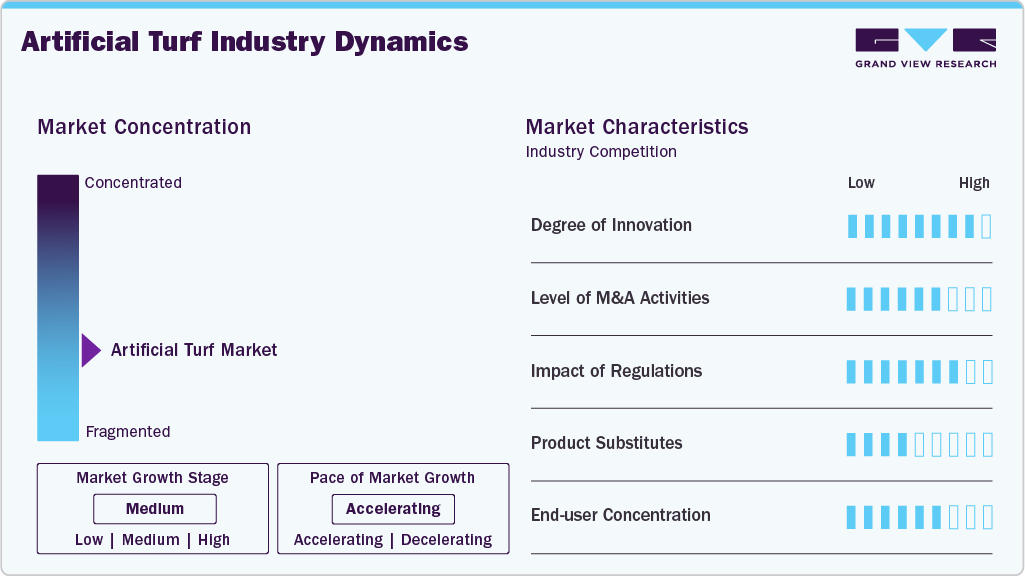
The threat of substitutes for artificial turf is moderate. Natural grass remains a competitor in regions where water scarcity is not a concern and maintenance costs are manageable. However, the growing emphasis on sustainability, performance consistency, and lower long-term lifecycle costs reduces substitution risk in landscaping and sports applications. Alternative surface materials like modular rubber tiles or poured-in-place synthetic surfaces may compete in specific use cases (e.g., playgrounds), but they lack the visual appeal and versatility of turf across multi-purpose installations. Advances in natural grass maintenance technologies could present some competition, but overall substitution threat remains limited
Material Insights
Polyethylene dominated the market with a revenue share of 63.1% in 2025. The demand for polyethylene artificial turf is expected to increase in the coming years due to its superior quality, versatility, and resemblance to natural grass. Polyethylene fibers are soft, non-abrasive, and durable, making them ideal for sports fields, residential lawns, and playgrounds where comfort and safety are priorities. Its resistance to UV radiation ensures color retention and durability under prolonged sunlight exposure, extending its lifespan. With growing investments in sports infrastructure and landscaping, alongside rising awareness of water conservation, the demand for polyethylene artificial turf is poised for significant growth.
Polypropylene artificial turf is expected to grow at a significant CAGR of 8.2% over the forecast period, due to its affordability, versatility, and lightweight properties. Polypropylene turf is particularly favored for applications in low-traffic areas such as decorative landscaping, rooftop gardens, and indoor spaces where durability requirements are less stringent. Its smooth texture and ease of customization make it suitable for non-sporting purposes, such as commercial displays and residential decorations. With rising demand for cost-effective, visually appealing artificial turf solutions across emerging markets and non-sport applications, polypropylene turf is poised for significant growth.
Application Insights
Based on application, this market is segmented into residential, commercial, and sports. Sports accounted for the largest revenue share of 63.1% in 2025.The demand for artificial turf in sports applications is expected to grow due to its ability to provide a durable, consistent, and low-maintenance playing surface. Unlike natural grass, artificial turf can withstand heavy use and extreme weather, making it ideal for high-traffic sports fields and multipurpose arenas. It ensures year-round usability and minimizes downtime caused by replanting or weather-related damage. Additionally, advancements in shock-absorbent, player-friendly infill materials have enhanced safety, reducing the risk of injury.
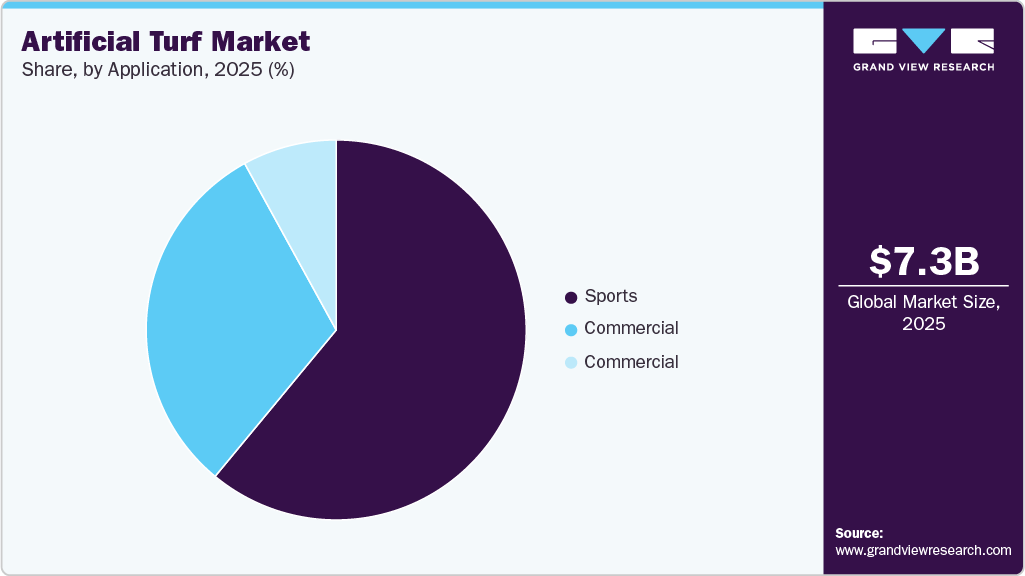
The demand for artificial turf in commercial applications is expected to grow at a significant CAGR of 8.6% over the forecast period, due to its cost-effectiveness, low maintenance requirements, and aesthetic appeal. Businesses and commercial establishments increasingly use artificial turf to enhance outdoor and indoor spaces such as office complexes, hotels, shopping centers, and event venues. Its durability and minimal water requirements make it an environmentally friendly solution, especially in regions facing water scarcity or strict landscaping regulations.
Regional Insights
Asia Pacific Artificial Turf Market Trends
Asia Pacific dominated the artificial turf market, accounting for the highest revenue share of 32.2% in 2025, driven by rapid urbanization, increased sports infrastructure investment, and government-led green development initiatives. Countries like China, India, Japan, and Australia are adopting artificial turf across commercial landscapes, school playgrounds, and public parks to reduce water usage and maintenance costs. Emerging markets in Southeast Asia also contribute as commercial rooftop and sports facility installations rise.
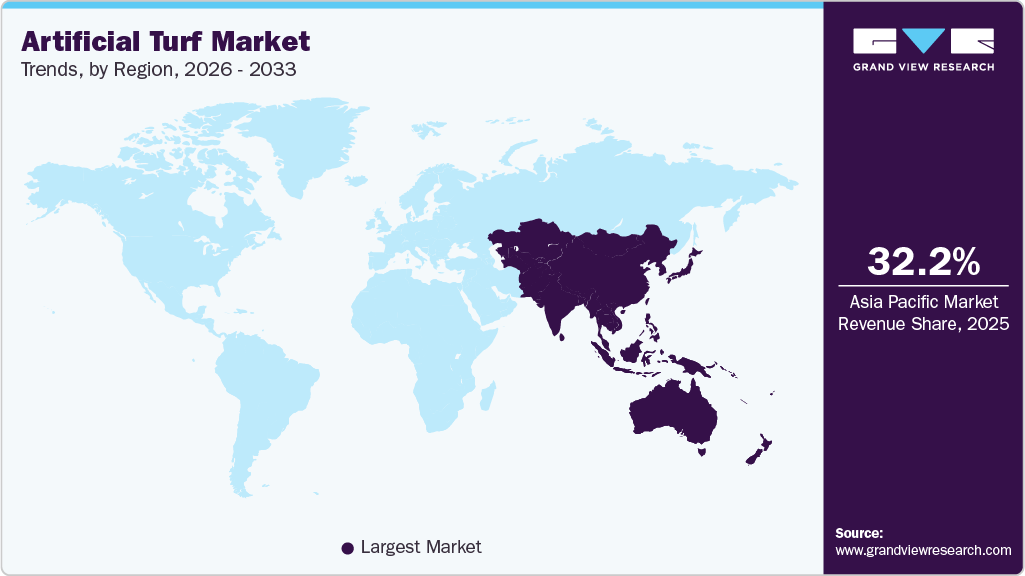
China’s artificial turf market is expanding rapidly, driven by urban beautification projects, school sports field upgrades, and commercial landscaping requirements. Urban municipalities are incorporating turf into public spaces to address water scarcity and maintenance challenges, supported by local infrastructure development policies. China’s strong manufacturing base also supports export growth.
India’s artificial turf market is growing steadily due to rising demand from sports facilities, schools, and urban landscaping projects. India is expected to grow at the fastest CAGR of 8.0% over the forecast period within the Asia Pacific region. Increasing water scarcity and low maintenance requirements are encouraging the use of artificial grass in public parks, residential lawns, and commercial spaces. Government support for sports infrastructure and the expansion of football, cricket, and hockey training centers are further boosting adoption.
North America Artificial Turf Market Trends
North America is witnessing rising demand for artificial turf as it is increasingly adopted for sports fields, residential landscaping, and commercial projects. The focus on water conservation and sustainable landscaping practices has led many municipalities and homeowners to opt for artificial turf as a viable alternative to natural grass. Additionally, the increasing popularity of organized sports and the need for year-round playable surfaces are driving its use in schools and sports complexes. Technological advancements and the development of eco-friendly artificial turf are further supporting market growth in this region.
The U.S. artificial turf market demand is fueled by the expanding sports industry and the preference for low-maintenance landscaping solutions. High schools, colleges, and professional sports teams increasingly use artificial turf to create durable, weather-resistant fields. Furthermore, rising awareness of water conservation, particularly in drought-prone states like California and Texas, has encouraged homeowners and businesses to adopt artificial turf for lawns and commercial spaces. The emphasis on eco-friendly and sustainable solutions aligns with the country's broader environmental goals, further driving demand.
Europe Artificial Turf Market Trends
Europe accounted for a significant share of the global market in terms of revenue in 2025 and is anticipated to grow rapidly over the projected period. Presence of a large number of sports fields, switching trends from natural grass to synthetic grass, and increasing popularity of outdoor sports are expected to uphold the market growth for artificial turf in the region.
The UK artificial turf market is growing due to its adoption in sports facilities and residential areas. Sports organizations, such as football clubs, are increasingly using artificial turf to ensure consistent playing surfaces and reduce maintenance costs. Additionally, artificial turf is being employed in gardens, schools, and urban landscaping projects as a practical solution for regions with high rainfall and limited sunlight. The rising popularity of low-maintenance, aesthetically pleasing outdoor spaces is contributing to the market's growth in the UK.
Latin America Artificial Turf Market Trends
The Latin America artificial turf market is likely to grow owing to the increasing popularity of football and the expansion of sports infrastructure. Governments and private organizations are investing in modernizing sports facilities, and artificial turf offers a cost-effective, durable solution for these projects. Additionally, as urbanization accelerates, artificial turf is being adopted for commercial and residential landscaping due to its low water requirements and suitability for diverse climates. The region's focus on sustainable development is further boosting demand.
Middle East & Africa Artificial Turf Market Trends
The demand for artificial turf in the Middle East & Africa is rising due to the region's extreme weather conditions, which make maintaining natural grass challenging. Artificial turf offers a practical alternative for sports fields, urban landscaping, and commercial spaces, requiring minimal water and upkeep. The development of sports infrastructure, particularly in preparation for large-scale events like the FIFA World Cup, has further accelerated its adoption in the Middle East.
Key Artificial Turf Company Insights
Some of the key players operating in the market include Shaw Industries Group, Inc. and Tarkett.
-
Shaw Industries Group, Inc. is engaged in designing, manufacturing, and supplying flooring materials to residential and commercial flooring applications. The product portfolio offered by the company includes resilient floorings, carpets, laminates & hardwood flooring, stone floorings, and artificial turfs.
-
Tarkett is engaged in designing and manufacturing flooring solutions for commercial and residential spaces. The company has 34 production facilities, 24 research laboratories, 4 design centers, and 7 recycling centers across the globe.
TIGERTURF and Limonta Sport S.p.A. are some of the emerging market participants in artificial turf market.
-
TIGERTURF is UK based artificial turf manufacturer and supplier. It provides synthetic turf for residential lawns, school campus, sports grounds, playgrounds, and for commercial landscaping purposes.
-
Limonta Sport S.p.A. was established in 1972 and it is involved in the manufacturing of artificial turf and hybrid turf pitches for various sport activities including tennis, hockey, football, rugby, basketball, badminton, and volleyball.
Key Artificial Turf Companies:
The following key companies have been profiled for this study on the artificial turf market
- Synthetic Turf International
- Shaw Industries Group, Inc.
- Sport Court Carolina
- Tarkett S.A.
- Synlawn Artificial Grass
- Act Global
- CONDOR Group
- TIGERTURF
- European Turf Group
- CC Grass
- ForeverLawn, Inc.
- Challenger Turf, Inc.
- Limonta Sport S.p.A.
- AstroTurf
Recent Developments
-
In June 2023, the MHC Weesp, a hockey club near Amsterdam manufactured a unique, dry, and artificial turf surface. This club is the first in the world to have a full-size hockey field based on TenCate's zero-water artificial turf technology.
-
In May, 2023, SYNLawn Artificial Turf featured outdoor amphitheater built for new town square. The designs of the town square included the amphitheater building & outdoor lawn for concerts, & other festivities; a community playground with a splash pad; and fire pits for socializing.
Artificial Turf Market Report Scope
Report Attribute
Details
Market size value in 2026
USD 7.81 billion
Revenue forecast in 2033
USD 13.67 billion
Growth rate
CAGR of 8.3% from 2026 to 2033
Base year for estimation
2025
Historical data
2021 - 2024
Forecast period
2026 - 2033
Quantitative units
Volume in million square meters and revenue in USD million/billion and CAGR from 2026 to 2033
Report coverage
Revenue forecast, company ranking, competitive landscape, growth factors, and trends
Segments covered
Material, application, region
Regional scope
North America; Europe; Asia Pacific; Latin America; Middle East & Africa
Country scope
U.S.; Canada; Mexico; UK; Germany; France; Italy; Spain; China; India; Japan; South Korea; Singapore; Australia; Brazil; Argentina; Saudi Arabia; UAE
Key companies profiled
Synthetic Turf International; Shaw Industries Group, Inc.; Sport Court Carolina; Tarkett S.A.; Synlawn Artificial Grass; Act Global; CONDOR Group; TIGERTURF; European Turf Group; CC Grass; ForeverLawn, Inc.; Challenger Turf, Inc.; Limonta Sport S.p.A.; AstroTurf
Customization scope
Free report customization (equivalent up to 8 analysts’ working days) with purchase. Addition or alteration to country, regional & segment scope.
Pricing and purchase options
Avail customized purchase options to meet your exact research needs. Explore purchase options
Global Artificial Turf Market Report Segmentation
This report forecasts revenue growth at global, regional, and country levels and provides an analysis of the latest industry trends in each of the sub-segments from 2021 to 2033. For this study, Grand View Research has segmented the global artificial turf market report based on material, application, and region.
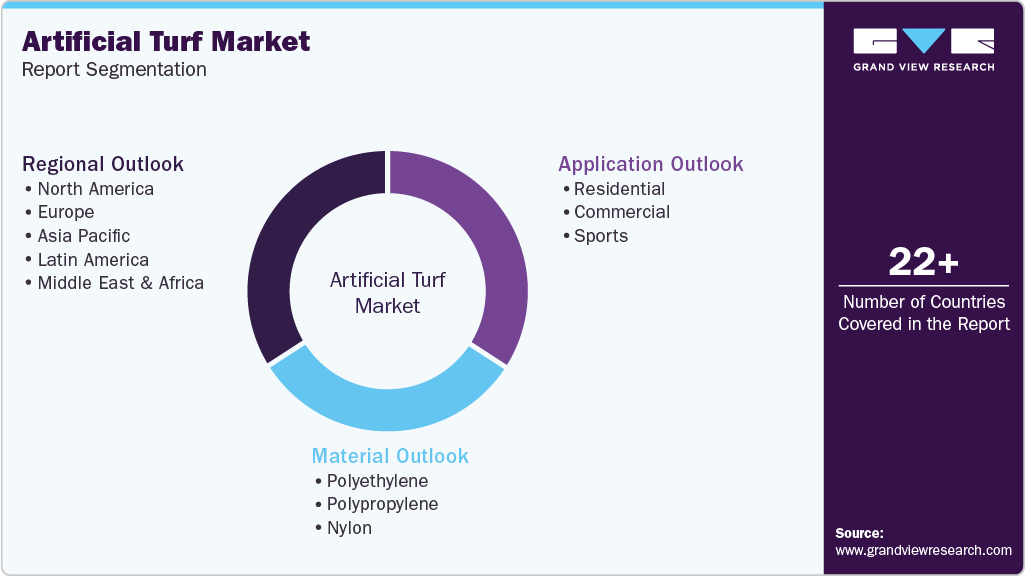
-
Material Outlook (Volume, Million Square Meters; Revenue, USD Million; 2021 - 2033)
-
Polyethylene
-
Polypropylene
-
Nylon
-
-
Application Outlook (Volume, Million Square Meters; Revenue, USD Million; 2021 - 2033)
-
Residential
-
Commercial
-
Sports
-
-
Regional Outlook (Volume, Million Square Meters; Revenue, USD Million; 2021 - 2033)
-
North America
-
U.S.
-
Canada
-
Mexico
-
-
Europe
-
Germany
-
UK
-
France
-
Italy
-
Spain
-
-
Asia Pacific
-
China
-
Japan
-
India
-
South Korea
-
Singapore
-
Australia
-
-
Latin America
-
Brazil
-
Argentina
-
-
Middle East & Africa
-
Saudi Arabia
-
UAE
-
-
Frequently Asked Questions About This Report
b. Key players operating in the market are Synthetic Turf International, Shaw Industries Group, Inc., Sport Court Carolina, Tarkett S.A., Synlawn Artificial Grass, Act Global, CONDOR Group, TIGERTURF, European Turf Group, CC Grass, ForeverLawn, Inc., Challenger Turf, Inc., Limonta Sport S.p.A., AstroTurf.
b. The key factors that are driving the artificial turf include due to its increasing adoption across sports, residential, and commercial sectors. The growing popularity of sports in developing countries, coupled with infrastructural development in these regions, further fuels the demand.
b. The global artificial turf market size was estimated at USD 7.27 billion in 2025 and is expected to reach USD 7.81 billion in 2026.
b. Based on material, the polyethylene accounted for the largest revenue share of 63.1% in 2025. The demand for polyethylene artificial turf is expected to increase in the coming years due to its superior quality, versatility, and resemblance to natural grass. Polyethylene fibers are soft, non-abrasive, and durable, making them ideal for sports fields, residential lawns, and playgrounds where comfort and safety are priorities.
b. The global artificial turf market is expected to grow at a compound annual growth rate of 8.3% from 2026 to 2033 to reach USD 13.67 billion by 2033.
Share this report with your colleague or friend.
Need a Tailored Report?
Customize this report to your needs — add regions, segments, or data points, with 20% free customization.

ISO 9001:2015 & 27001:2022 Certified
We are GDPR and CCPA compliant! Your transaction & personal information is safe and secure. For more details, please read our privacy policy.
Trusted market insights - try a free sample
See how our reports are structured and why industry leaders rely on Grand View Research. Get a free sample or ask us to tailor this report to your needs.










